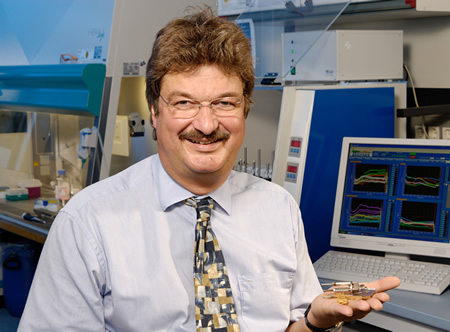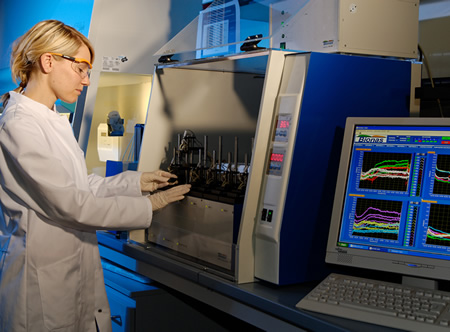« car2go: Daimler's Innovative Mobility Concept is Coming to the USA | Main | Fiat Group to sponsor G8 Summit »
June 17, 2009
A Comfortable Office Climate: Siemens Sensors for Buildings
• Sensors are to become the sensory organs of buildings.
• Siemens scientists are working to unite as many detection and measuring functions as possible on a single chip.

Photo: Siemens Corporate Technology is working on sensors which can monitor the climate in buildings and make it comfortable. The scientists develop sensors not only for measuring light and temperature but also for detecting odors and measuring different gases, such as CO2. (© Siemens AG)
The goal of the Siemens researchers is to develop sensors which act as the sensory organs of buildings and pass on their information to a building management system. These tiny watchmen make the management system know, for example, where aggressive substances have leaked or simply where the lights are to be switched off or the windows opened due to too high a CO2 level in the air.
Today, room climate sensors, air quality sensors and presence sensors can already control the air and light conditions in offices in relation to the number of persons present. And, using optimized control technology, they thus save up to 30 percent more of the energy consumption for heating, ventilation and air conditioning than that is done by any conventional control and regulating technology.

Photo: A lab technician of Siemens Central Research measuring the acidification, impedance and respiration rate of the cell sensors. (© Siemens AG)
In addition to sensors for measuring light and temperature as well as for the detection of different gases, the scientists are currently developing cell sensors which are to be used as an early warning system for contaminated water or bad air. The cells of these "living" sensors react to deviations by changing their metabolism which can be measured. They live in a nutrient on a silicon chip. The chip evaluates the data and sends them to a master process control system. The advantage over chemical sensors: Living cells react to all toxins.

Photo: CAR KEY -- Just how flexibly the tiny measuring instruments can be used is demonstrated by an alcohol sensor in an Automobile Key developed by Siemens. After the driver has blown into the sensor, it measures the level of alcohol in his breath by means of a conductive metal oxide which reacts to the gases. If the value exceeds the limit of 0.5 per thousand, for example, the key switches off and the engine will not start. (© Siemens AG)
This patented electronics system of the Siemens researchers is currently being tested in the field by a vehicle manufacturer.
Source: Siemens AG, Munich, Germany.
|GlobalGiants.com|
• GlobalGiants.Com is Member of the Boxxet Network Mixxed Green (Green and Sustainability)







Edited & Posted by the Editor | 12:22 PM | Link to this Post







